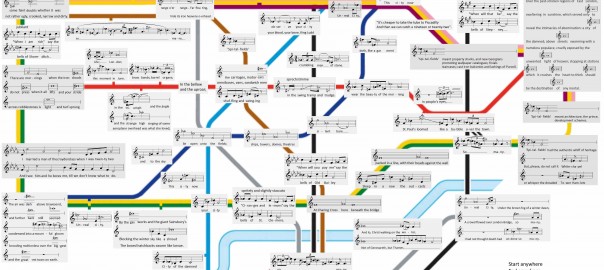“London, he felt fairly certain, has always been London.”
By Ewan Campbell
More than almost any other city, the London of today is inseparable from the many, many Londons that have existed. When I decided to write a piece evoking the city, it seemed futile to me to strive for a singular and personal response to this plethora of Londons, and instead I decided to compose a sort of London-soup.
The title is taken from George Orwell’s 1984 and is one of the myriad texts used in this piece, which have been taken from novels and poems inspired by the many faceted London. These include quotes from novels, such as Dickens’ description of Pip’s disgust at arriving at Charing Cross, or Woolf’s evocation of London’s excitement in Mrs Dalloway (“what she loved; life; London; this moment in June”), and even a quote from a Samuel Pepys’ diary about the great fire in 1666. There are extracts from poems: Wordsworth’s sunrise reverie on Westminster Bridge; D.H. Lawrence’s pre-war discovery of ‘the outcasts’ under Charing Cross bridge; the well-known folk-song “Oranges and lemons”; and several extracts from poems by Will Hatchet (Elephant and Castle: “At London’s gate it rose, democratic and utilitarian”).
The various texts are fragmented, both by the manner in which they are set to music (part-spoken, part-sung), and by the way that many of them are actually divided up and interspersed amongst their highly contrasting counterparts. This leads me, suitably tangentially, to an explanation of how the score is made up: in each performer’s part musical fragments (ranging from 2-20 seconds) are spread out over a 2-dimensional map-score, in which the performer has, at any given moment, freedom to choose which musical fragment follows which. This is a genre of composition that I have been exploring for some time, but for this piece I decided to base the score on the map that is most often associated with London: the underground map.
I wanted the four members of the Hermes Experiment to have autonomy to choose their own paths, independently of one another. Inevitably it is then impossible to predict not only what fragments will follow one another in one performer’s part, but also which of those will synchronise with those of another performer’s part. A composer like John Cage would take a philosophical approach, embracing the random sonic results. Unfortunately I find myself, not content with this, and instead embarked upon the lengthy process of making sure that every choice each performer can make at each junction is musically interesting. Then, in order to achieve some sense of unity between the parts, I sought inspiration from an unusual source: Terry Riley’s In C, in which the vast majority of the notes are (as you’ve guessed already), in C major. Those that are not from C major, are from suitably related keys, and the piece thus avoids anything more difficult than the very softest of dissonances.
I am not interested in the complete avoidance of dissonance, indeed I enjoy the full range of harmonic colours and flavours, but also want to prevent dissonance from overwhelming a piece, and perversely resulting in something bland. So, like Riley, I limited myself to a subset of notes (a slightly altered Phrygian mode on F, if you are interested), but also allowed myself a few alterable pitches (much like the deviations found in the melodic minor scale). The result will be unpredictable, made anew every time, and hopes to be more than just this composer’s subjective response to London.
The piece will be premiered at The Cockpit on 27th October: tickets are available here.
